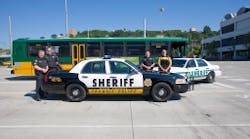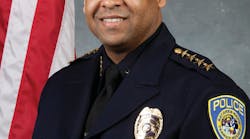The Denver Regional Transportation District (RTD) has pretty low statistics when it comes to activity, but of course they're facing many of the issues that are general to transit and its open environment.
Assistant General Manager Safety, Security & Facilities David Genova says, "Trying to physically protect an environment that's open is just next to impossible. Not only access on to buses and trains and stations, but when you're also trying to look at protecting your critical infrastructure, like some of our stations where the buses go underground.
"How do you protect those portals in a practical way when you have buses coming and going all the time?"
Transit operates in a challenging environment and in some ways it's really hard to mitigate. The layered security approach and security starting during the design phase is what helps keep RTD safe.
"A lot of the things we do with our design criteria, start at the very beginning with how do we make our transit environment as comfortable and safe for our patrons as possible so their perception is that they feel safe," Genova explains. "When we're in the design phase and in our planning phase, we build a lot of things into the project like lighting criteria in stations, video surveillance at all of our rail stations, video surveillance onboard most of our buses and all of our rail vehicles."
With design criteria for all modes, including a design manual on light rail, on commuter rail and on bus-related services, there's a chapter dedicated to safety and security as a starting point for safety.
"That's been a really great tool because if you don't get it in early, you hate to go back," Genova says. And, of course, more expensive.
RTD Officers
RTD itself has four officers, but uses off-duty police in Denver and now expanding that into Aurora. Genova says they're looking at using a kind of part-time police because they operate in multiple jurisdictions, and that's a challenge.
"Law enforcement typically won't cross jurisdictions for a variety of reasons, so one of the things we're looking at, that John [RTD Transit Police Chief of Police John Tarbert] has brought forward, is a part-time police model where we would actually hire officers from various jurisdictions that would actually be an RTD employee in a part-time capacity." Genova adds, "Very similar to an off-duty program.
"They would be working under their training, their certification, but they would wear the RTD uniform, since they're our employee."
In Colorado, the definition of a transit peace officer is anywhere within RTD's district, so an officer from Aurora could work anywhere in the district legally, so it's something they're discussing with the board about. Without having to have a full-on police force, it would allow RTD to have a lot more focused police presence.
Chief Tarbert also oversees the 24-hour security command center where all of the video comes to and all of the emergency telephones connect to. The center is staffed like it's a public safety access point (PSAP), just like a 9-1-1 center – usually double-staffed.
It is also linked to the TransitWatch program, the 24-hour hotline riders can call, email or text regarding any issues.
Texting to the 24-hour hotline has proven to be very effective for RTD. If someone is witnessing something and they don't want to draw attention to themselves, sending a text is a discreet way to alert RTD.
"Last year we had 1,400 text messages and out of the 1,400, 900 resulted in arrests at the next stop on either the bus or train," Tarbert says. "It's amazing how effective that is. And the public sees that happening too, so it makes them feel safer."
Fare Inspection and Heightened Visibility
RTD introduced using plain-clothes police officers to do fare inspections on routes. Like most light properties, RTD has a proof-of-payment fare inspection. With the uniformed officers, some argued people would simply avoid them, so other tactics were thrown into place.
"One of the added benefits that we really didn't think about up front was, now when a police officer contacts you about fare – it's a criminal violation in Colorado – so then they're able to run that person for warrants," Genova says. "It's a great tool for the police; it gives them an opportunity to stop someone."
"In the last 3-1/2 years, we arrested 4,000 people that were wanted on warrants," Tarbert says. "And that's the only reason they were contacted, was because they didn't pay their fare."
When this program was first started, RTD set it up so a local Fox station would be out with them and from the public information side, Scott Reed, assistant general manager, communications, was concerned as there are at least 10 things to go wrong for every one right.
Reed says, "I'm all worried about this and sure enough, the first stop that they go to, a guy goes right by the undercover officer and doesn't pay the fare.
"He contacts the guy and it turns out that he's wanted so here they take him off in handcuffs."
And the girlfriends statement on TV was, "I can't believe you've got to pay to ride the bus!"
"On the news, that was the message; these guys are serious," Reed states. "It was just perfect; it could not have worked any better."
Finding Partners
In 2008 Tarbert started a Committee of Emergency Response Teams (CERT) program and right now, RTD has 359 people from the community trained to serve as members for the District. "People that ride our system, whether bus or train, we give them a three-day training class," Tarbert says.
The state of Colorado has Ready Colorado, which is a state initiative to have community response teams. They're all done in different fashions at each place; every government does their own, whether it's city, county, etc. "I thought, why couldn't we do something like that," says Tarbert. "We have our own environment, people don't know us well enough and the state thought, cool, go for it."
The first two days are trained by state-certified CERT instructors and they learn about such things as firefighting, including actually fighting a fire with a fire extinguisher, search and rescue tactics, first aid, and CPR. The third day is with the RTD.
"I do a terrorism awareness class for everybody and then a few exercises on both a bus and a train and they learn how to escape from the vehicles," Tarbert explains. "Plus, we give them a backpack full of tools: a pry tool, helmet, vests, gloves, eye protection, first aid kit ... just as a starter and if something happens on the system, they can actually go out there and assist."
Prior to January there were more than 300 on the waiting list to start training.
Tarbert stresses, "It's really great and the public loves it."
Other help for a presence for RTD has been through the Visible Intermodal Prevention and Response (VIPER) through TSA. Tarbert says, "They're not law enforcement, but they come out in their uniform.
"They do all sorts of special events with us. It's a uniformed presence for a deterrent factor that's random and unannounced. We know of course, because we have to work with them." He adds, "It's a great program; they're a good federal partner."
The program is well established now, but just as with any other initiative RTD introduces, Genova says a lot of outreach is important.
"When it was kicked off it was kind of hard because the patrons were kind of like, what's all this presence?" Genova adds, "And that's where Scott's group [Communications] did a great job, but whenever we're introducing these things, we don't want people to see people walking around with K-9s in their federal garb."
As Tarbert says, "They think it's an incident."
Now the program has been going on long enough that people recognize it and appreciate the additional presence to feel safe on the system.
Transit Chief Police Peer Advisory Group
Tarbert explains that he sits on the Transit Chief Police Peer Advisory Group, which was formed by the TSA and DHS three years ago. There are 20 chiefs that sit on the panel and they advise DHS on how to help them in mass transit, because most people don't understand it.
"It's an interesting group," Tarbert says. "We actually did an intel briefing to the new deputy director of homeland security for counter-terrorism, who just recently started. It was a phone conference we were talking to him on, but he, again, 'Wow, I didn't know mass transit had these kinds of things. Everyone says it's always a target, but I didn't know what you guys are really talking about.'
"It's a really neat group to be a part of," Tarbert adds.




